Latest Covid Figures Show Omicron’s Spread In Iran
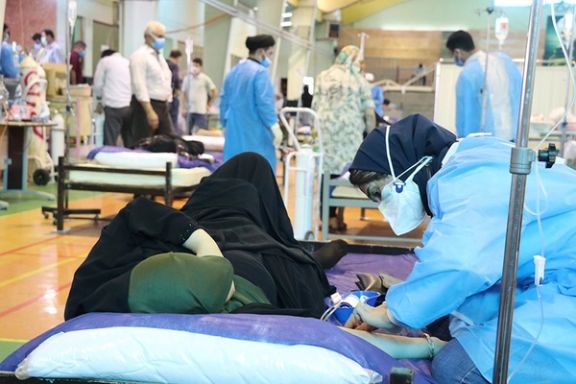
Iran is enduring its sixth wave of infections by the Covid-19 as the daily death roll reached 227 on Wednesday, with 70 in Tehran.

Iran is enduring its sixth wave of infections by the Covid-19 as the daily death roll reached 227 on Wednesday, with 70 in Tehran.
The health ministry out the total number of people infected with the coronavirus since the outbreak of the pandemic at nearly 7 million: 15,340 had tested positive in the past 24 hours, with 2,333 in hospital.
Tehran constitutes 10 percent of Iran’s population and if the capital had 70 Covid deaths in one day, the nationwide toll could have been higher than the 227 figure the government announced on Wednesday.
Iran has the Middle East’s highest official figures for Covid fatalities with around 135,500 deaths in an 85 million population with 67 percent fully vaccinated. Egypt, with 29 percent of its 104-million population fully vaccinated, has reported just under 29.000 deaths.
Iran’s statistics, announced daily by the health ministry, have been questioned by – among others – the principlist newspaper Javan and BBC Persian. While health authorities have warned the figures are likely to increase over the next two months with the onset of the Omicron variant, President Ebrahim Raisi has rejected proposals for a nationwide shutdown.
This week, Iran returned about 820,000 doses of AstraZeneca vaccines donated by Poland, with a media report alleging they had been made in the United States.
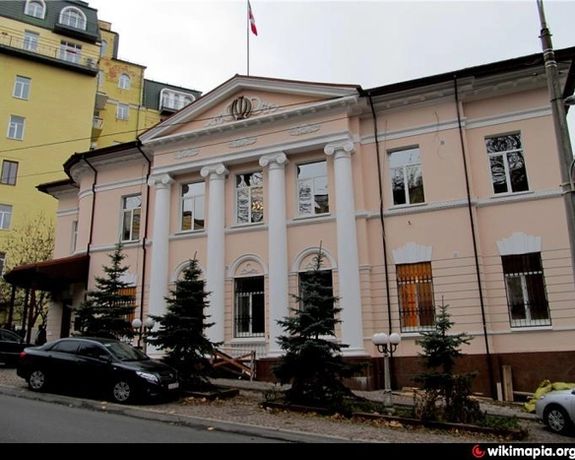
The Islamic Republic has called on Iranian nationals livening in Ukraine, especially students, to leave the country "temporarily".
Iran’s embassy in Kiev issued a statement on Wednesday as the situation in Ukraine is growing increasingly tense.
The embassy has also urged the Iranian citizens to refrain from traveling to "high-risk areas" and to “temporarily leave the country” if their presence in Ukraine is not absolutely necessary.
The statement also called on Iranians to maintain contact with the embassy for "necessary coordination in case of emergency."
Iran has blamed NATO for the recent escalation in the Ukraine crisis, calling for restraint from both sides, as Russia has moved to dismember the country.
"Unfortunately, NATO's provocative measures and interventions, led by the US, have further complicated the situation in the region” Foreign Ministry spokesman Saeed Khatibzadeh said.
President Vladimir Putin announced late Monday that Russia recognized the independence of two breakaway regions of Donetsk and Lugansk in eastern Ukraine held by separatists, practically paving the way for the deployment of Russian troops.
The decision by Moscow has triggered international condemnation and a promise of targeted international sanctions by the United States and the European Union.
An urgent meeting of the United Nations Security Council (UNSC) was held on the deepening crisis as the United States said the announcement by Putin was an “unprovoked violation of Ukraine’s sovereignty and territorial integrity”.
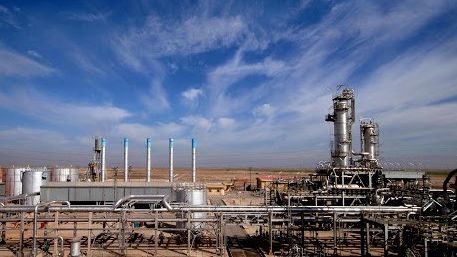
Oil market watchers await a nuclear deal with Iran that can lift United States' sanctions and boost crude exports offsetting a decline in global supplies.
Oil prices hover around their eight-year highs and reaching the psychologically unsettling $100 a barrel mark reminiscent of a the early 2010s.
In analysis Wednesday, John Kemp wrote for Reuters that “time is ripe for a renewed agreement between the United States and its allies and Iran that swaps sanctions easing for limits on enrichment and other nuclear activities.”
OPEC and its oil-producing allies known as OPEC+ have reduced daily oil supplies by around 650,000 barrels after larger cuts in 2020 in the wake of COVID-19 and declining demand. Now, they have agreements in place not to increase production to pre-pandemic levels, although demand is approaching that volume.
Some also argue, that irrespective of agreements among OPEC+ countries it is simply hard to revive production at oil fields that were partially or fully shut down for two years.
Therefore, hopes focus on a nuclear deal with Iran, which analysts hope can add another 500,000 barrels a day to global supplies and prevent prices from braking through the $100pb threshold.
But it is not certain that Iran can deliver that extra volume in the coming months. By all indications Tehran is already exporting around 1.2 million barrels per day, mostly to China and its capacity to export much more is questionable.
Iran’s domestic consumption is well over two million barrels pd and in order to export 1.7 or 1.8 million per day, its total production should come very close to four million bpd, which would be almost impossible, at least this year.
Iran’s parliament Speaker Mohammad Bagher Ghalibaf, urging caution in drafting the budget this week, warned lawmakers that pinning more hopes on oil revenues is unrealistic. He explicitly said that Iran cannot produce four million bpd and its maximum export capacity is 1.4 million barrels. This is just 200,000 more than its current estimated daily exports.
Before the US withdrew from the 2015 nuclear deal known as JCPOA and imposed sanctions in 2018, Iran was exporting around 2 million bpd, but that capacity seems to have slipped away for now.
Before the 1979 revolution Iran was producing well over 5 million pd, but that capacity has declined over the last four decades because of lack of investments and technology.
Iran’s oil minister Javad Owji said last November that the country needs $160 billion in investments in its oil and gas industry to prevent further declines in production.
That is not a task to be accomplished in one or two years, even if Iran’s relations with West improve far beyond an impending nuclear dealseen by many as a partial or temporary agreement.
Lifting of US sanctions can nevertheless add some Iranian oil to global supplies, but whether it would enough to lower prices is related to other factors such as the Ukraine crisis and the how much production will increase in the United States at current high prices.
Reuters notes that the Biden administration, under the political pressure of high inflation, is interested in a deal with Iran to boost oil supplies. Washington is facing a three-pronged crisis with Russia, China and Iran. “Prioritization implies US policymakers need to concentrate on the immediate policy problem (Russia) and their long-term top priority (China) while de-escalating a conflict with is neither pressing nor of the first order (Iran),” the article argues.
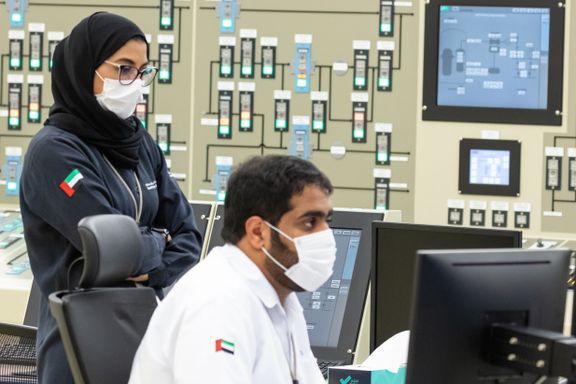
The United Arab Emirates' only nuclear power plant is "well protected" against security threats, the regulator said Wednesday, following a series of drone and missile attacks by Iran-backed Houthis.
Yemen'sHouthis said in 2017 they fired a cruise missile towards the Barakah plant, a report which the UAE denied. The group has repeatedly threatened to target critical infrastructure in the UAE.
The Houthis have claimed three drone and missile assaults on the UAE this year. A January 17 strike killed three people in Abu Dhabi and wounded more.
The United States and United Nationas experts have said Iran is supplying the sophisticated drone and missile technology to Houthis.
"The nuclear power plant is designed according to high security principles and we have issued regulations for physical and cyber security," Federal Authority for Nuclear Regulation (FANR) Director General Christer Viktorsson said.
"The sensitive parts of the power plant are well protected for any event," he told reporters. The UAE overall has "robust security", he added.
The plant in Abu Dhabi, one of the UAE's seven emirates and the nation's capital, is the Arab world's first nuclear power station and part of the oil producer's aim to achieve net zero emissions by 2050.
Barakah will have four reactors with 5,600 megawatts (MW) of total capacity - equivalent to 25% of the UAE's needs. The first unit began delivering 1400 MW to the national grid in April 2021.
Reporting by Reuters
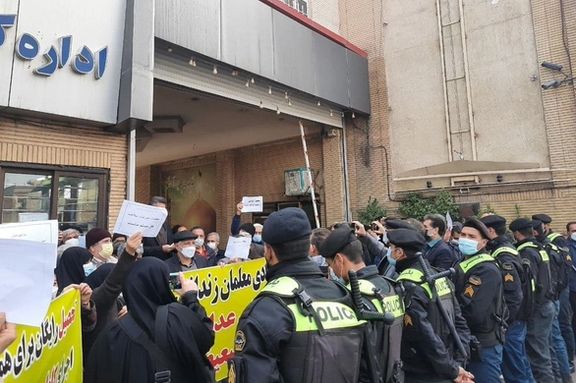
Thousands of teachers Tuesday threatened an “uprising” if higher pay was not offered by President Ebrahim Raisi and Parliament Speaker Mohammad-Bagher Ghalibaf.
"Raisi, Ghalibaf, This is the last call. Teachers' movement is prepared for an uprising", teachers chanted in protests in Shiraz, Fars province (video), and Shahr-e Kord in Chahr Mahal province (video), as well as Ilam in Ilam province, and around 50 other cities.
The same slogan appeared on banners and posters in all rallies, including Tehran where teachers protested in front of the parliament.
There were also chants against the state broadcaster (IRIB), which has not covered earlier protests. "Enough Oppression and Injustice. There's Nothing on Our Tables" and "The Country Has Become A Thieves' Den. Sanctions Are Only an Excuse," chanted protesters in Najafabad in Esfahan province, dismissing any notion that Iran’s economic troubles were anything to do with United States ‘maximum pressure’ imposed in 2018.
A female teacher in Anzali (video), Gilan province, lambasted Iran’s authorities for teachers’ ills. "We weren't the ones who looted the Melli (National) Bank, we weren't the ones who pillaged the Teachers' Savings Fund, we weren't the ones who looted the Development Fund. We don't own villas and gardens in Canada [like some former officials]. We weren't the ones who smuggled important national documents out of the country. We are right here, beside you. We are easy to find, we are in schools, classes and with your children, brothers, and sisters.”
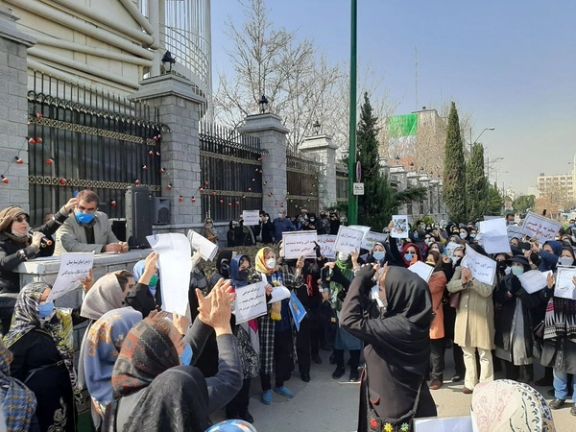
And it didn’t stop there. "Taking the teachers by the neck, dragging them on the ground, kicking them, is nothing you could be proud of,” she opined. “You must take the looters and pillagers if order in the country is important, if security in the country is important.” A teacher in Esfahan said in her speech Tuesday who also said that after thirty years of service she now must work as a cab driver to make ends meet.
Equal pay with other civil servants
This was the fifth nationwide protest by teachers in the past two months as they demand implementation of decade-old legislation that would bring the salaries and pensions of 750,000 teachers in line with other civil servants.
The budget bill that President Ebrahim Raisi presented to parliament December 12 proposes a 14-percent increase in the education ministry's budget but does not earmark resources for a teachers’ pay rise.
Food prices have risen by more than 60 percent this year, on top of high inflation in the four years since a jump from 9.6 percent in 2017 to 30.2 percent in 2018 and around 40 percent in 2021.
Some scuffles were reported during the demonstrations on Tuesday and security forces arrested at least two more teachers, Solmaz Feyzollahzadeh in Karaj in Alborz Province and Ali Hasan-Bahamin in Shiraz in Fars Province.
Teachers, whose rallies are organized by the Coordination Council of Iranian Teachers’ Union, also demanded the release of colleagues arrested in earlier protests. Shabnam Baharfar, a teacher arrested in Karaj Saturday, is still in custody but others arrested the same day have been released. Some scuffles were reported during the demonstrations on Tuesday.
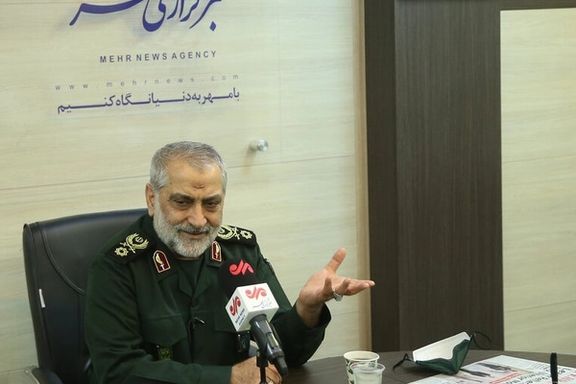
A senior Iranian military official has urged regional countries to strengthen their relations with the Islamic Republic instead of Israel.
Spokesman for Iran’s Armed Forces Brigadier General Abolfazl Shekarchi told Mehr news agency on Tuesday that the smallest strategic mistake by Israel “will be met with our harshest response” without directly referring to the recent Israeli threats against the Islamic Republic.
He commented on Israel’s regional alliances without mentioning normalization of ties with the United Arab Emirates and Bahrain, saying, “We do not consider the Zionist regime to have capability to cause insecurity for the Islamic Republic.”
"We advise the countries of the region that in fact they should look at the powerful country of Iran as a very strong and independent neighbor and strengthen their relations with the Islamic Republic to preserve their dignity," Shekarchi said, adding that “The Zionist regime is hated by all nations no matter their religion.”
Israel’s Defense Minister Benny Gantz warned on Sunday that even if a nuclear deal is signed, Iran must be stopped from becoming a nuclear threshold state.
Moreover, Israeli Foreign Minister Yair Lapid urged the United States on Monday not to remove Iran’s Revolutionary Guard (IRGC) from its list of terrorist groups, as nuclear talks in Vienna near a conclusion.
Lapid said, “The terrible nuclear deal is about to be signed in Vienna. Iran is seeking to cancel the Revolution Guard’s listing as a terrorist organization. If they’re not a terror group, then what are they? A folk dancing troupe?”